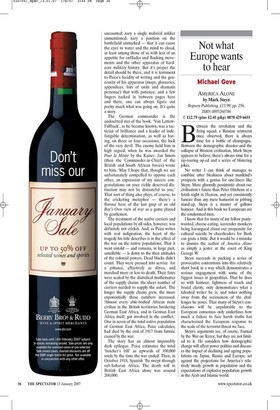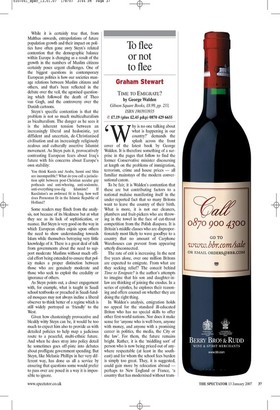Not what Europe wants to hear
Michael Gove AMERICA ALONE by Mark Steyn Regnely Publishing, £15.99, pp. 256, ISBN 0895260786 £12.79 (plus £2.45 p&p) 0870 429 6655 Between the revolution and the firing squad, a Russian aristocrat once observed, there is always time for a bottle of champagne. Between the demographic disaster and the collapse of Western civilisation, Mark Steyn appears to believe, there's always time for a rip-roaring op-ed and a series of blistering jokes.
No writer I can think of manages to combine utter bleakness about mankind's prospects with a genius for one-liners like Steyn. More gloomily pessimistic about our civilisation's future than Peter Hitchens at a fetish night in Heaven, and yet consistently funnier than any mere humorist or jobbing stand-up, Steyn is a master of gallows humour. And in this book we Europeans are the condemned men.
I know that for many of my fellow pantywaisted, cheese-eating, surrender monkeys being harangued about our propensity for cultural suicide by cheerleaders for Bush can grate a little. But it would be a mistake to dismiss the author of America Alone as simply a jester at the court of King George W.
Steyn succeeds in packing a series of provocative contentions into this relatively short book in a way which demonstrates a serious engagement with some of the biggest issues in geopolitics. That he does so with humour, lightness of touch and brutal clarity, only demonstrates what a talented writer he is, and takes nothing away from the seriousness of the challenges he poses. That many of Steyn's conclusions will be unpalatable to the European consensus only underlines how much a failure to face harsh truths has characterised the European response to the scale of the terrorist threat we face.
Steyn's arguments are, of course, framed by the War on Terror, but they are not limited to it. He considers how demographic change will affect power politics and discusses the impact of declining and ageing populations on Japan, Russia and Europe, set against the projections for America's relatively steady growth in population and the expectations of explosive population growth in the Arab and Islamic world.
While it is certainly true that, from Malthus onwards, extrapolations of future population growth and their impact on politics have often gone awry Steyn's related contention that the demographic balance within Europe is changing as a result of the growth in the numbers of Muslim citizens certainly poses urgent challenges. One of the biggest questions in contemporary European politics is how our societies manage relations between Muslim citizens and others, and that's been reflected in the debate over the veil, the agonised questioning which followed the death of Theo van Gogh, and the controversy over the Danish cartoons.
Steyn's specific contention is that the problem is not so much multiculturalism as biculturalism. The danger as he sees it is the inherent tension between an increasingly liberal and hedonistic, yet diffident and uncertain, de-Christianised civilisation and an increasingly religiously zealous and culturally assertive Islamist movement. As Steyn puts it, provocatively contrasting European fears about Iraq's future with his concerns about Europe's own stability: You think Kurds and Arabs, Sunni and Shia are incompatible? What do you call a jurisdiction split between post-Christian secular gay potheads and anti-whoring, anti-sodomite, anti-everything-you-dig Islamists? If Kurdistan's an awkward fit in Iraq, how well does Pornostan fit in the Islamic Republic of Holland?
Some readers may flinch from the analysis, not because of its bleakness but at what they see as its lack of sophistication, or nuance. But Steyn is very good on the way in which European elites enjoin upon others the need to show understanding towards Islam while themselves betraying very little knowledge of it. There is a great deal of talk from governments about the need to support moderate Muslims without much official effort being extended to ensure that policy makes a proper distinction between those who are genuinely moderate and those who seek to exploit the credulity or ignorance of others.
As Steyn points out, a closer engagement with, for example, what is taught in Saudi school textbooks or preached in Saudi-funded mosques may not always incline a liberal observer to think better of a regime which is still widely portrayed as 'friendly' to the West.
Given how chasteningly provocative and bleakly witty Steyn can be, it would be too much to expect him also to provide us with detailed policies to help map a judicious route to a peaceful, multi-ethnic future. And when he does stray into policy detail he sometimes goes off-piste into debates about profligate government spending. But Steyn, like Melanie Phillips in her very different way, has done us all a service by ensuring that questions some would prefer to pass over are posed in a way it is impossible to ignore.























































 Previous page
Previous page